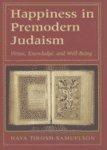
Book Summary
Traces the Jewish discourse on "happiness" from antiquity to the seventeenth century. From Plato to the present, Western philosophers have debated the meaning of "happiness." Is it a feeling, a subjective psychological state, a general disposition, or a regulative idea? What are the conditions necessary for its attainment? What is the connection between happiness and virtue and how does it relate to pleasure? That Jews were interested in happiness may appear odd to most people. According to conventional thought, its pursuit hardly seems like one of the major tenets of the religion. This book argues to the contrary. Not only did Jewish thinkers reflect on the concept of happiness, they devoted considerable attention to it. Moreover, the author argues, Judaism understood itself as the best path to a happy life, and that happy life is inseparable from a set of religious beliefs, the most important of which is that God, the creator of the world, has a special relationship with the People of Israel, to whom He revealed His wisdom and will in the form of law: the Torah. To demonstrate the connection of Judaism with the good life, Tirosh-Samuelson shows how Aristotle's reflections on happiness were very much a part of Rabbinic thought and how Jewish philosophers in the Hellenistic period, most notably Philo of Alexandria, read the Jewish Scriptures in light of the Greek conception of happiness. The fusion of Greek and Judaic perspectives reached its zenith during the Middle Ages, especially in the works of Moses Maimonides. Tirosh-Samuelson shows how even the controversies that arose regarding Maimonides' ideas can be viewed as discussions of the relationship of virtue to knowledge. Much ofthis book, then, concerns the reception of Aristotle's ethics in medieval Jewish philosophy. The book is arranged chronologically, showing the correlation between a given notion of happiness and Jewish history and culture at a particular time. Demonstrating how the discourse on happiness is a dramatic interplay between wisdom and Torah, between philosophy and religion, and between reason and faith, Tirosh-Samuelson presents--for the specialist and the non-specialist alike--a fasciating tour of Jewish intellectual history.
Book Details
| Book Name | Happiness In Premodern Judaism: Virtue, Knowledge, And Well-Being |
| Author | Hava Tirosh-samuelson |
| Publisher | Hebrew Union College Press (Oct 2003) |
| ISBN | 9780878204533 |
| Pages | 500 |
| Language | English |
| Price | 2939 |








